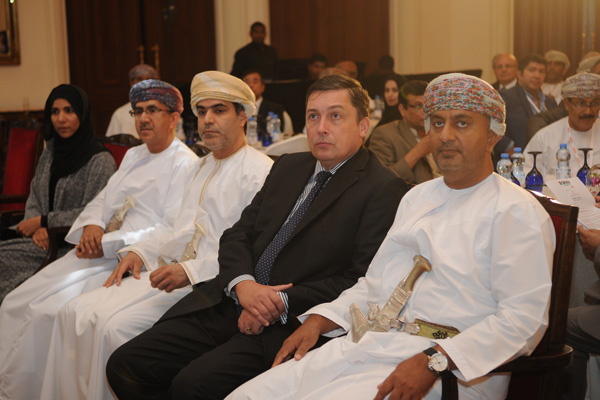
Dr Al Sunaidy (far right) listens to panel discussions
at the forum
Oman turns to private sector to boost future growth
MUSCAT, October 27, 2015
Oman will adjust to lower oil prices by using public private partnerships (PPP) and involving the private sector in a bid to boost economic growth, according to an expert.
Speaking at MEED's Oman Projects Conference, Dr Ali Massoud Al Sunaidy, the Minister of Commerce and Industry, said: “In the future, our experience in liberalising power generation, water production and communications will pave the way for the privatisation of other service and utilities.
“In the discussions of the 9th five-year plan, there is no better time to drive privatisation further, and provide the foundation for a new era of public private partnership.”
The three-day conference will conclude tomorrow (October 28) at the Al Bustan Palace, Muscat, where regional and international experts will continue to shed light on opportunities and challenges in Oman’s projects market.
The frameworks for PPP and private investments are being prepared for the wastewater, health, housing schemes; as well as priority sectors by the Higher Ministerial Committee for PPP.
As oil revenues in Oman fall, the Sultanate is looking to reduce the financial burden of public services and promote the private sector and small and medium enterprises. The Ministry of Commerce and Industry is also preparing a new investment law.
Richard Thompson, MEED editorial director, said: "Muscat has been introducing reforms to promote the private sector for some years, and it has had success using the private-finance model in the electricity and tourism sector. But the impact of lower oil prices on government finances is an opportunity to really accelerate these reforms. But it comes with challenges, too.
"The private sector will want less bureaucratic restrictions such as localisation quotas and the loss of oil revenues will require subsidy cuts and the introduction of new tariffs and taxes."
A new five-year plan, currently being prepared, will cover 2016 to 2020 and will focus on the following key sectors: logistics and transportation, manufacturing, minerals, tourism, and agriculture and fisheries.
It will significantly involve the private sector on all major projects before treasury funding is considered. If there is no private sector interest, the government may step in to fund important strategic projects.
Dr Al Sunaidy also raised some questions during his address, which future PPP collaborations need to address, such as whether or not the government will continue to involve itself further in Medina Irfaan, and choose to just fund the existing roads, hotels and conference centre; or whether the state should just invest in the infrastructure in the South Batinah Logistics Area, leaving the construction of warehouses, networks and provision of services to the private sector.
Medina Irfaan is a sevent-kilometre square development near Muscat Airport, for which masterplanning is underway, while the South Batinah Logistics Centre is a 96,000 sq m hub, for which earthworks are almost completed. - TradeArabia News Service







